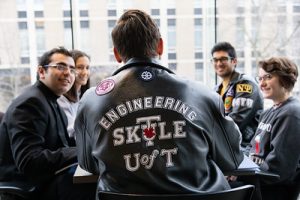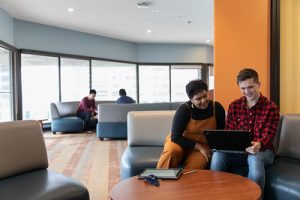This week I wanted to share more on something that I’m personally very passionate about, our Engineering Society (EngSoc). I wrote an earlier post about getting involved in Skule and specifically with EngSoc, so if you haven’t read that yet you should definitely give it read as well.
EngSoc is very near and dear to my heart, especially now as I have the privilege of being your Vice-President Academic for the year. I’ve certainly talked about it a lot this summer but I think there’s value in you and your peers being fully aware of the services EngSoc provides, so that you can make the most of your time here.
The EngSoc Office!
Yes, we do have an office!
While at this point we students cannot yet be on campus for health and safety precautions, you’ll eventually be able to stop by our office in the Sandford Fleming building and say hello once it’s safe to do so. In the meantime, this year we’ll be running remote Office Hours when you can join a call and chat with us whenever some time is available. Especially if you’re having trouble tracking down a specific resource or website, chatting face-to-face over a call is a fast way to get some information and help. Aside from office hours, you should also expect an EngSoc newsletter in your inbox every month. The newsletter covers all important communications we need to provide including information on clubs, elections, and general EngSoc resources.
Clubs Fair
Every year EngSoc runs a clubs fair in September (this year, it’s happening on Wednesday, September 9)
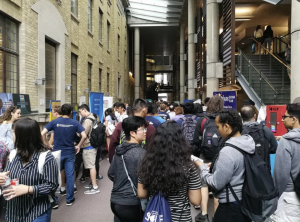
open to all students (however, it’s specifically designed with first years in mind). While it’s running remotely this time around, all our affiliated clubs plan to participate and are even receiving training to ensure we put on an informative and accessible event for everyone.
What you as incoming students should do is plan how to make the most of this day. Prepare in advance by asking yourself what sorts of student groups or passions you’re interested in and would consider being a part of with others. In advance of the fair, EngSoc will send out a full list of the “booths” participating so when you do join the fair you can sign-up with those groups first, and then browse around to see what else Skule has to offer. I’m of the belief that the best groups are the ones you’ve probably never heard of until now.
Academic Advocacy
School can be exciting and a lot of fun, but school can also be tough. That’s why EngSoc has a few resources to help you out along the way.
courses.skule.ca is a site where you can view past course exams for U of T Engineering classes. Keep in mind that both course instructors and exam styles can change year-to-year, so don’t rely on those exams as your only study resource for a course. You’ll be receiving plenty of notes, problem sets and practice questions during the semester to properly prepare you in your courses.
The website also has the F!rosh Anti-Calendar, a space dedicated solely to first-year courses. There, you can get a detailed course description, ratings on course resources, useful skills to practice, and tips for success for each course. The website is managed and curated by the Vice-President Academic, but the data comes directly from students who were once in your shoes, wanting to help first years have a smooth transition to university.
Discipline Clubs
Each of the Engineering programs we offer has an associated Discipline Club in Skule (e.g. Chem Club, EngSci Club, etc.). Discipline Clubs like other clubs in Skule are run completely by students, but sometimes do receive support and mentorship from their respective departments.
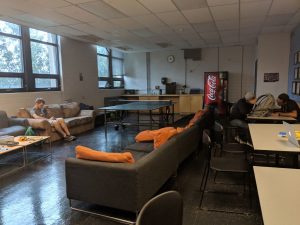
One of the primary responsibilities of a Discipline Club is managing their Common Room. On-campus the common rooms are physical spaces accessible only to students of that discipline via your T-Cards. While the university does have them cleaned and tidied by Facilities, the Discipline Clubs are able to configure the space to what suits the needs of their students. They can even apply for renovation projects to keep their infrastructure current and accessible for all.
Until we’re back on-campus, the clubs will be operating virtual common rooms, with several in partnership with their department’s administrative team. Since you’ll be spending most of your class time online with 2T4 students, these virtual common rooms will hopefully allow you to meet some upper-year students too and chat with them about what to expect throughout undergrad.
Discipline Clubs will also host guest speakers, often graduates of that discipline or other successful professionals of the field. The hope is to get students, especially first years, excited about the many possible research and industry employment opportunities available once they complete their schooling.
The Discipline Clubs also organize your discipline’s Dinner Dance. These dances are held at an event venue off-campus with a semi-formal dinner, dancing and even performances by some of Skule’s musical ensembles. It’s a nice, fun excuse to dress up and socialize with your peers outside the classroom. All students of that discipline are able to purchase tickets and bring students of other disciplines as guests. Even members of the faculty buy tickets and attend, especially when they’ve never been before. Many of my EngSci instructors have attended EngSci Dinner Dance over the years; even EngSci’s Chair Professor Cluett made an appearance last year and joined other faculty in the evening’s festivities. While the fate of dinner dances is unclear at least for this year, they’re a cherished part of the Skule community and will most certainly return when it is safe to do so.
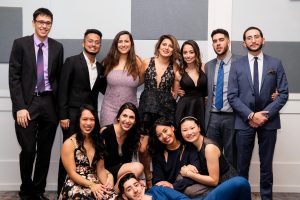
Discipline Clubs do a lot, so it’s no surprise it takes a lot of work to keep them running. The clubs are spearheaded by a Chair and Vice-chair, and supported by executives and directors specializing in areas such as finance, academics, student life, wellness, and even equity and inclusivity. After your first year, you’ll be able to run in an election and become an executive or director in your own discipline club.
That’s all for this week, see you next week for the final blog post!
Mirjana

